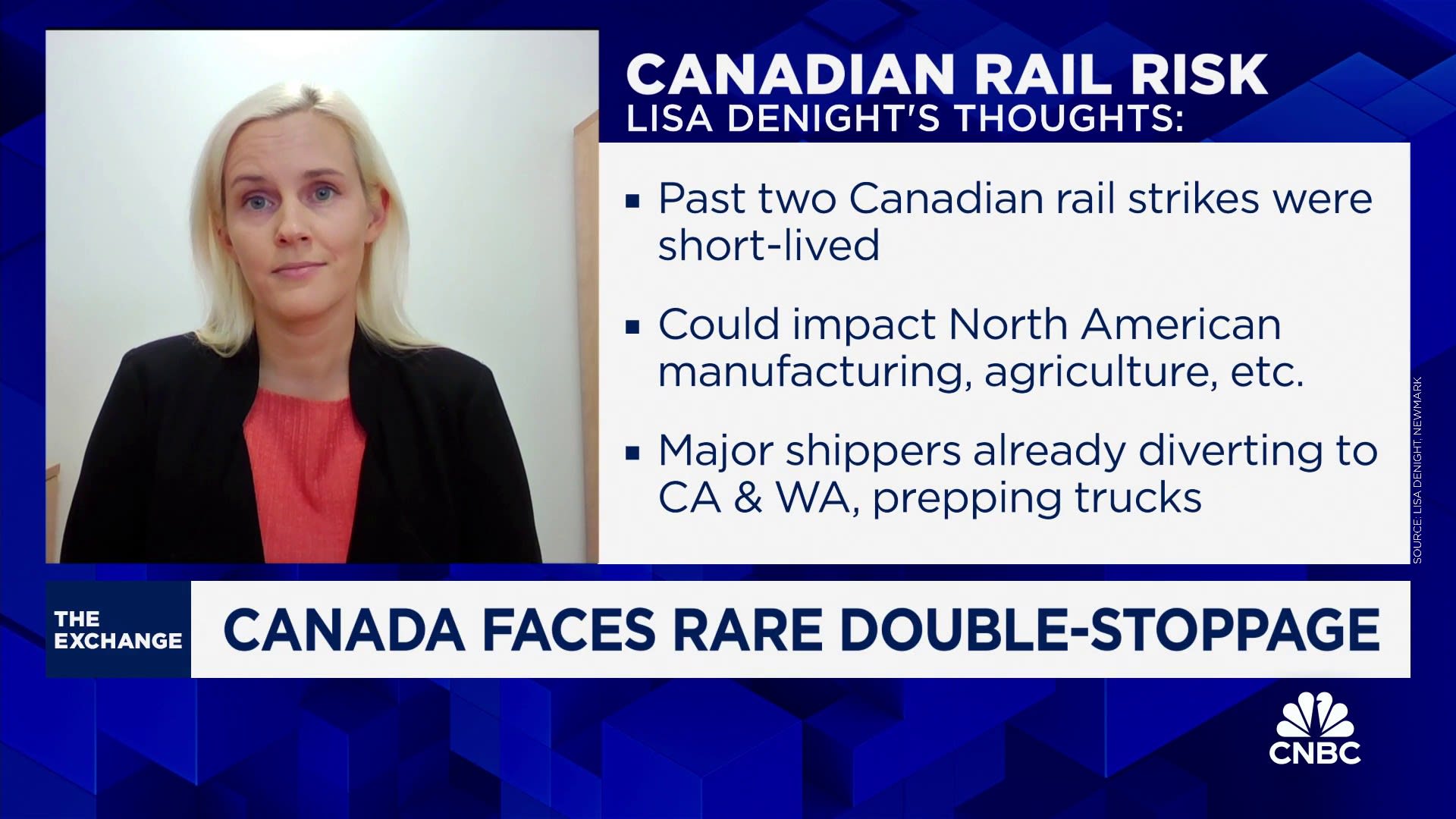
Locked out railway workers demonstrate outside of the CN Rail Brampton yard on August 22, 2024 in Brampton ON, Canada.
Ian Willms | Getty Images
Hours after the Canadian labor minister told a labor board to review his request for binding arbitration and restart rail operations, CNBC has learned both the railroad companies and the worker’s union have been called for individual management conferences with the board.
Canada’s Labor Minister Steven MacKinnon said at at press conference that he was “confident” the Canada Industrial Relations Board (CIRB) would accept his referral.
“Negotiated agreements have and always will be the best way forward,” a statement from MacKinnon said. “Collective bargaining is how the strongest, longest lasting deals are made – deals that are good for unions and employers alike.”
MacKinnon’s office told CNBC that the CIRB gets to decide whether to move forward with the request.
The highly integrated trade relationship between the Canadian and U.S. economies has left billions worth of cargo in limbo after over 9,000 freight rail workers represented by the Teamsters Canada union were locked out by Canadian National Railway (CN) and Canadian Pacific Kansas City (CPKC) after months of failing negotiations.
CNBC has reached out to CIRB for comment. MacKinnon’s office told CNBC that it can take up to 24 hours for the CIRB to announce its decision.

Shortly after MacKinnon’s comments, both Canadian railroads announced their plans to restart operations.
CN told CNBC that they have ended their lockout. In a statement, the company wrote, “while CN is satisfied that this labor conflict has ended and that it can get back to its role of powering the economy, the Company is disappointed that a negotiated deal could not be achieved at the bargaining table despite its best efforts.”
CPKC said it was preparing for a “safe and orderly resumption” of operation and “will follow the order of the CIRB once it executes the Minister’s direction.” They have not lifted their lockout.
“The Canadian government has recognized the immense consequences of a railway work stoppage for the Canadian economy, North American supply chains and all Canadians,” said Keith Creel, CPKC president and CEO. “The government has acted to protect Canada’s national interest. We regret that the government had to intervene because we fundamentally believe in and respect collective bargaining; however, given the stakes for all involved, this situation required action.”
The Teamsters Canada Rail Conference told CNBC that picket lines would remain in place while they reviewed MacKinnon’s referral and the CIRB’s response and consulted with their legal counsel to determine next steps. “By resorting to binding arbitration, the government has allowed CN and CPKC to sidestep a union determined to protect rail safety,” the statement said. “Despite claiming to value and honour the collective bargaining process, the federal government quickly used its authority to suspend it, mere hours after an employer-imposed work stoppage. This action mirrors their earlier interference this year, where they used the CIRB to stifle bargaining for months,”
Teamsters Canada confirmed to CNBC they were meeting with the CIRB tonight to participate in their case management conference.
Rail cross-border trade with the U.S. is at a standstill, which according to the U.S. Department of Transportation, accounted for 14% of total bilateral trade of $382.4 billion between the countries for the first half of the year. Approximately $572 million in container trade arrives daily in the U.S. from Canada, according to U.S. Census data.
Rails are a large component of logistics for companies, from Dow Chemical to automakers in Detroit like Ford and General Motors, which use the rails to transport auto parts. Retailers such as Walmart, Target, Nike, Procter & Gamble and Canada Goose also import some of their goods into Canadian ports which are then transported by rail and truck. According to Everstream Analytics, 66% of cargo arriving at the Port of Vancouver is moved by rail to final destinations in Canada or in the U.S. Midwest, which includes fertilizer, iron ore, grain, cement, salt, potash, coal, cars, wood/timber as well as containers loaded with consumer goods or intermediate parts.
American Apparel & Footwear Association President and CEO Steve Lamar urged the representatives of the unions and management to return to the negotiating table until a long-term deal is reached.
“Rail is an essential part of the ecosystem that helps you get dressed every day,” said Lamar. “A work stoppage/lockout at Canadian National and a strike at Canadian Pacific Kansas City comes at a critical time for back-to-school and just at the start of the holiday inventory rush. Approximately 30% of clothes, shoes, and accessories move by rail. Keeping goods moving supports not only the rail jobs at issue, but also the jobs of millions of other workers up and down our supply chains.”
Jim Vena, CEO of Union Pacific, wrote in a letter to Canadian Labor Minister Steve MacKinnon that upwards of 2,500 of his railroad’s cars could be stuck in Canada. “For every one day of disruption, you can expect at least 3-5 days of recovery — perhaps even more, given two Canadian railways are impacted.”
Ocean carriers and U.S. rail companies announced contingency plans and fees ahead of the lockouts, including Hapag-Lloyd, which added a $350 per Bill of Lading diversion fee for imports to North America that were slated for Canadian ports with inland U.S. delivery. Maersk and Norfolk Southern adjusted their business plans ahead of a potential strike. CMA CGM issued a notice breaking out the potential rerouting of vessels to U.S. ports and restrictions on rail shipments. Ocean carriers began declaring force majeure on Thursday, the legal power to waive contractual requirements due to a situation beyond their control, according to a client advisory seen by CNBC sent by Ocean Network Express (ONE), one of the largest global shipping companies.
Companies also started embargoes across their networks on specific intermodal shipments, including hazardous materials and temperature-controlled containers.
According to Rob McRae, vice president of transportation for Univar Solutions, the largest chemical and ingredient distributor in North America, the U.S. exported $28.5 billion of chemical exports to Canada in 2023, accounting for 17.4% of total U.S. chemical exports.
“These types of disruptions have massive downstream impacts to our supply chain,” said McRae. “With Canada ranked No. 1 for U.S. exports and with the U.S. importing $24.3 billion of chemical imports from Canada on an annual basis, we look to both sides to come to an agreement soon and not allow this strike to negatively impact not only our industry, but our country.”
Chemicals caught up in the rail battle include sulfuric acid, which is used in drain cleaning products, phosphates used in laundry detergent, and acetone, which is used in the nail industry and as a solvent that breaks down grease and wax. Sodium fluoride, found in toothpaste, and sodium bicarbonate, also known as baking soda, come through the West Coast ports of Canada and are then transported via rail. Additional products transported into the U.S. include paint, food, power drinks, water purification, and personal care products.
Paul Brashier, vice president of global supply chain at ITS Logistics, warned of higher trucking rates as customers look to move their rail-bound freight by road.
“Operations will grind to a halt and everything will have to move to the road for both domestic and international containerized freight,” Brashier said. “This demand can drive rates through the roof.”
Logistics experts tell CNBC they are still hopeful of a quick settlement, either through a negotiated contract settlement, or Canadian government intervention (such as action by Parliament).
The CN MacMillan Yard is shown on August 22, 2024 in Vaughan, Canada. A labor dispute between Teamsters union members and Canada’s two main rail carriers, Canadian National Railway and Canadian Pacific Kansas City, could disrupt supply chains in the United States and Canada.
Ian Willms | Getty Images
The length of rail worker shifts, and the rest periods granted to workers between shifts, are sticking points in the talks.
Paul Bingham, director of transportation consulting at S&P Global Market Intelligence said a disruption of a day or two would have a minimal lasting impact on the economy, while a disruption extending beyond that will tend to increase in impact every day due primarily to the increasing amount of time after the disruption is over for the transportation system and supply chains to recover. “As backlogs grow at production and rail network interchange locations, it will take longer and longer to work through the backlogs, which takes time and increases the costs,” Bingham said.
Data reflected a limited number of front loading of energy and chemicals.
Companies felt the supply chain pinch last summer when the ILWU Canada labor union went on a 13-day strike which impacted Canadian rail service. The Canadian Manufacturers & Exporters Association estimated last year that the port strike disrupted $380 million a day in trade, and logistics experts are warning the dual rail strike could be even more devastating for the Canadian economy.
Around $277 billion worth of goods are moving annually on the Canada’s railways, and 75% of all exports are moved into the U.S via CN and CPKC. The Canadian rails connect the pivotal U.S. hubs of Chicago, New Orleans, Minneapolis, and Memphis.
Last year’s strikes at the Canadian West Coast ports slammed rail freight and it took months for the backlog to be eliminated.


